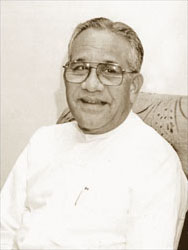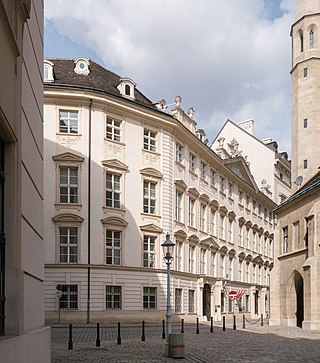Ministry of Religious Affairs and Public Education may refer to:
Ministry of Religious Affairs and Public Education may refer to:

The Ministry of Culture is the government department of Greece entrusted with preserving the country's cultural heritage, promoting the arts, and overseeing sport through the subordinate General Secretariat for Sports. The incumbent minister is Lina Mendoni. The Deputy Minister is Christos Dimas.

Lakshman Jayakody was a Sri Lankan politician, an SLFP stalwart and the Minister of Cultural and Religious Affairs in the Sri Lankan Cabinet from 1994 to 2000.

The Home Ministry was a Cabinet-level ministry established under the Meiji Constitution that managed the internal affairs of Empire of Japan from 1873 to 1947. Its duties included local administration, elections, police, monitoring people, social policy and public works. In 1938, the HM's social policy was detached from itself, then the Ministry of Health and Welfare was established. In 1947, the HM was abolished under the Supreme Commander for the Allied Powers restoration, then its administrative affairs were proceeded to the National Police Agency, the Ministry of Construction, the Ministry of Home Affairs and so on. In 2001, the MOHA was integrated with the Management and Coordination Agency and the Ministry of Posts and Telecommunications, then the Ministry of Public Management, Home affairs, Posts and Telecommunications was established. In 2004, the MPHPT changed its English name into the Ministry of Internal Affairs and Communications. In other words, the MIC is the direct descendant of the HM.

Islam in Djibouti has a long history, first appearing in the Horn of Africa during the lifetime of Muhammad. Today, 98% of Djibouti's 490,000 inhabitants are Muslims. According to Pew, 77% follow the denomination of Sunnism, whilst 8% are non-denominational Muslim, and the remaining 13% follow other sects such as Quranism, Shia, Ibadism etc.. After independence, the nascent republic constructed a legal system based in part on Islamic law.
Ministry of culture may refer to:

The Ministry of Education of the Union of Soviet Socialist Republics (USSR), formed on 3 August 1966, was one of the most important government offices in the Soviet Union. It was known as the People's Commissariat for Education, or Narkompros, until 1946. Narkompros was a Soviet agency founded by the State Commission on Education and charged with the administration of public education and most of other issues related to culture.
The Constitution of Bahrain states that Islam is the official religion and that Shari'a is a principal source for legislation. Article 22 of the Constitution provides for freedom of conscience, the inviolability of worship, and the freedom to perform religious rites and hold religious parades and meetings, in accordance with the customs observed in the country; however, the Government has placed some limitations on the exercise of this right.
In Qatar, the Constitution, as well as certain laws, provide for freedom of association, public assembly, and worship in accordance with the requirements of public order and morality. Notwithstanding this, the law prohibits proselytizing by non-Muslims and places some restrictions on public worship. Islam is the state religion.

The Ministry of Minority Affairs is the ministry in the Government of India which was carved out of the Ministry of Social Justice and Empowerment and created on 29 January 2006. It is the apex body for the central government's regulatory and developmental programmes for the minority religious communities and minority linguistic communities in India, which include Muslims, Sikhs, Christians, Buddhists, Zoroastrians (Parsis) and Jains notified as minority religious communities in The Gazette of India under Section 2(c) of the National Commission for Minorities Act, 1992.
A ministry of religious affairs is a government department responsible for religious matters, including:

The Ministry of Religious Services, formerly the Ministry of Religious Affairs and Ministry of Religion, is a government ministry of Israel that handles Jewish religious affairs.

The Republic of Cameroon is a decentralized unitary state.
The Ministry of Religious Affairs and Public Education was a short-lived government ministry of the Russian Empire, directing all educational and scientific institutions and the spiritual affairs of all faiths within Russia.

The Ministry of Education is the government ministry of Austria in charge of public schools and academic institutions.

The Ministry of Religious Affairs is an Indonesian ministry that administers religious affairs. It is responsible to the president, and is led by a minister.

The Ministry of Cultural Affairs is a ministry of the Government of People's Republic of Bangladesh, in charge of national museums and monuments; promoting and protecting the arts in Bangladesh and managing the national archives. The Ministry of Cultural Affairs is also charged with maintaining the Bengali identity.
The status of religious freedom in Africa varies from country to country. States can differ based on whether or not they guarantee equal treatment under law for followers of different religions, whether they establish a state religion, the extent to which religious organizations operating within the country are policed, and the extent to which religious law is used as a basis for the country's legal code.

State Islamic Institute of Teungku Dirundeng Meulaboh is an Indonesian Islamic public university in Meulaboh, West Aceh Regency.